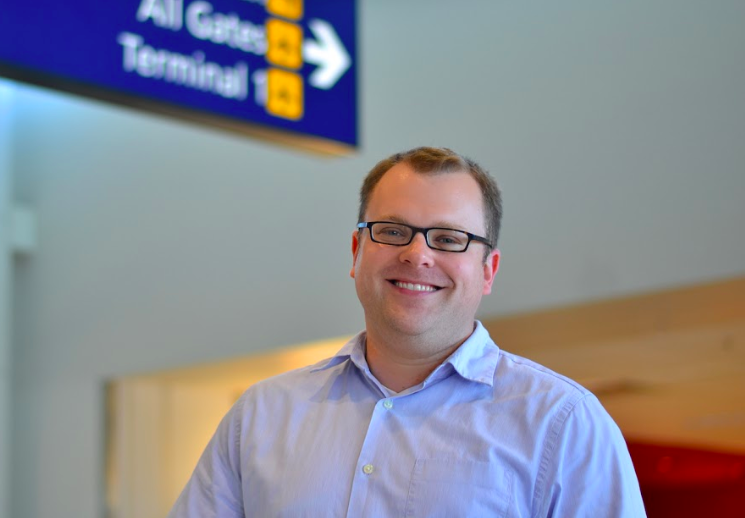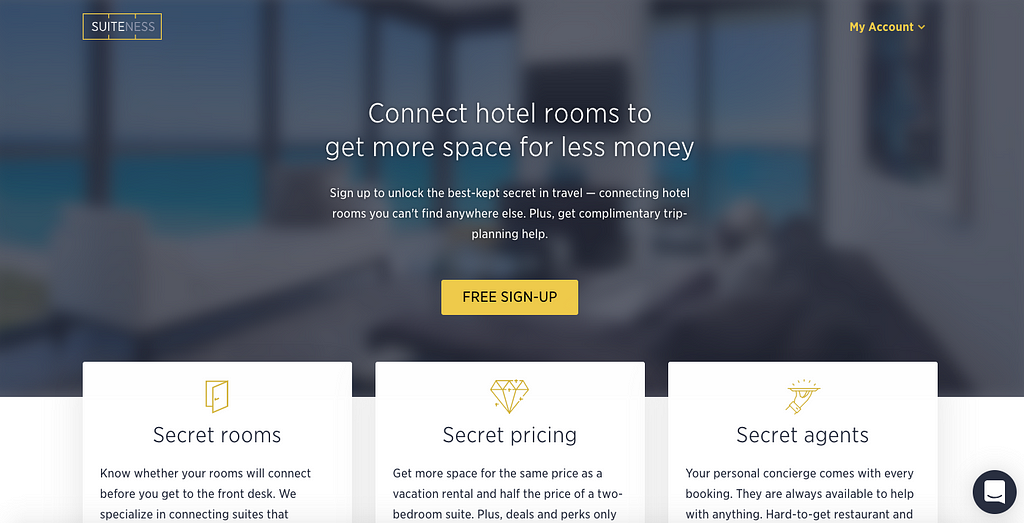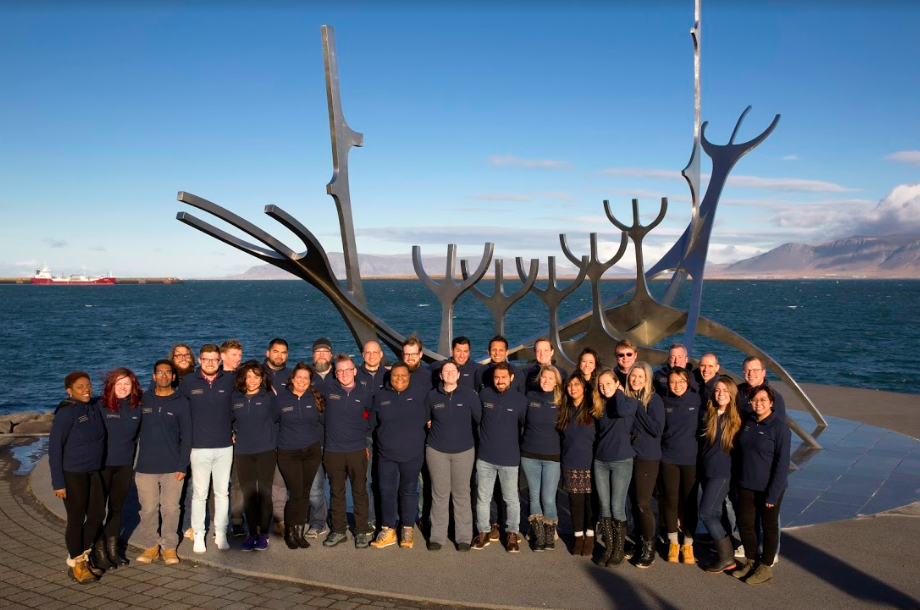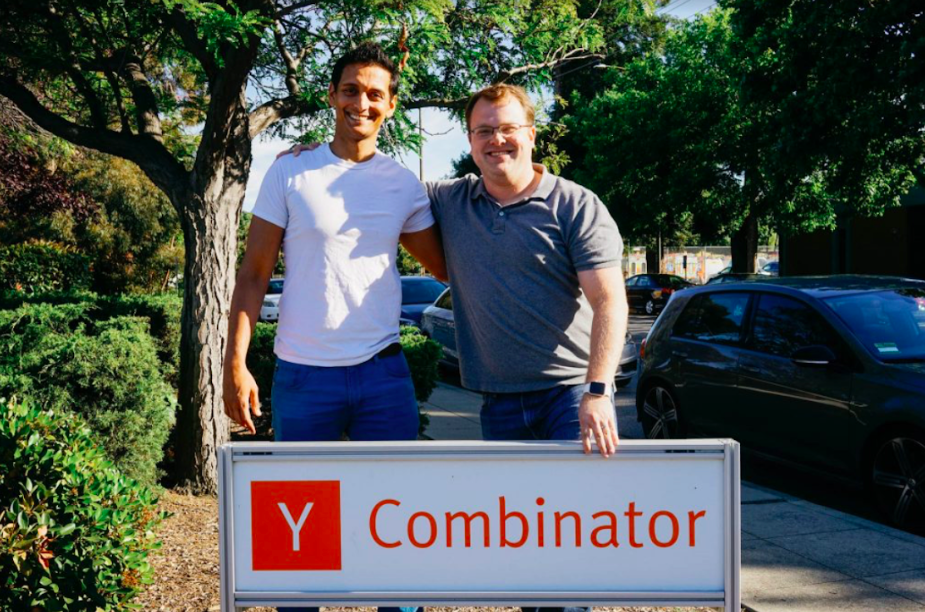Latest news about Bitcoin and all cryptocurrencies. Your daily crypto news habit.
 Kyle and the Suiteness team have built a platform that allows larger groups to book connecting hotel rooms and hotel suites that aren’t normally listed on booking websites.
Kyle and the Suiteness team have built a platform that allows larger groups to book connecting hotel rooms and hotel suites that aren’t normally listed on booking websites.
What’s your background, and what are you working on?
I’m Kyle Killion, founder of Suiteness, a travel company with a simple goal: increase the number of vacations people take by making them better, more affordable, and easier to plan. I have built products at companies including Apartment List, Coupa, Yelp, and Apple, and I have founded companies such as maccontrol.
Suiteness started out as Flights With Friends, an app I built for real-time trip planning and collaboration between travelers. We eventually pivoted to the current version of Suiteness when we learned that travel is actually a dictatorship, not a democracy (more on that below).
Suiteness fills a growing gap in the travel market for families and friends that want the space and privacy of a home, but don’t want to sacrifice the comforts, security, and amenities of a hotel. We are the only free-to-join booking website that offers connecting hotel rooms and suites for 4 or more guests for half the price of a two-bedroom suite or the same price as a vacation rental. We are the only booking option that can guarantee your rooms will connect before you get to the front desk. We also provide 24/7 complimentary trip-planning assistance from real people.
Our primary customers are families vacationing together, but many of our customers use Suiteness to plan trips with their friend groups or for special occasions like bachelorette parties and weddings. Over the last year, we have doubled to more than half a million members and increased awareness nearly 300x.
What motivated you to get started with your company?
I was running product at Apartment List in San Francisco and living in Oakland. My wife and I were about to have our first child when I had an important realization: I needed a shorter commute and better work/life balance or I would never see my daughter. So I did what any rational person would do and started my own company. I knew I wanted to do something that would make it easier for people to travel more. Side note: Suiteness is still remote-first with work/life balance still key tenets of Suiteness’ company culture today.
The first idea was classic mistake that tech people make when they look at group travel: I can fix this with software. I quickly learned that travel is not a democracy, and most groups have one person that I call the dictator (I can say this because I am one) who does all the planning. But, travel hero is more accurate because without them, the trip doesn’t happen.
Those travel heroes were asking for multi-bedroom suites and I assumed I had them because we had everything that Expedia and Booking.com does. It turns out that those sites only get a few suites from some hotels and there was a world of inventory they didn’t have access to. Since Las Vegas was our most popular destination I reached out to all the hotels there to see if I could get their suites. They all laughed at me and told me that customers only want to book suites on the phone.
Finally, The Cosmopolitan took a chance on me and let me email them every time a user was interested in their suites. So I added a webform that somewhat automated those emails and in the first month I had made more commission than in the previous year. I shut down the Flights With Friends site, made a simple iOS version of the same webform and called it Suiteness.
I knew I had something, but I would need a round of funding to pay for the direct connection to the hotels’ system and I needed someone who could convince hotels to sign on. Luckily I met Robbie Bhathal whose infectious energy had our first funding round closed within months and partners lining up. In fact, the first wire transfer came in within days of his son being born.
In another stroke of luck, my friend Stephen Caudill, the best software architect I’ve ever met, became available right around this time. The three of us were off to the races, and by off to the races I mean we had to work our asses off for a year with little traction until we had enough hotel partners to be truly useful to our customers.
What went into building the initial product?
I had been exclusively on the product side of things at Apartment List, Yelp, and Coupa for a few years before starting the company. So my code skills were rusty, and thankfully my friend Arthur helped a lot to get me back up to speed. I went all-in and bootstrapped while working on the company full-time. It took about 3 months to get a first version to that could collect feedback from users and about 6 months to get to the point where we could launch on Techcrunch.
The first iteration was called Flights With Friends and was a Rails app that used Websockets extensively for the real-time collaboration between travelers. The flight data came from services like Skyscanner and Wego and the hotels from Expedia and Booking.com. It was a beautiful thing — the trouble was that people didn’t want it. It hurts to throw away all the code you have written for so long, but most of the time it is necessary.
I’m going to gloss over the first version of Suiteness I wrote myself, which was an iOS app with a Rails back-end. It was done within weeks and it mainly existed to prove that people truly wanted to book suites on the internet. It was enough to get us our first outside funding from Structure Capital and Cyan Bannister.
The real Suiteness is a Clojure/Clojurescript app hosted on Heroku that Stephen and I created and was first launched in 2015. The first year was a slog of slow integrations with partners and a trickle of bookings. Around the same time we got enough hotels to be truly useful in Las Vegas, we were accepted into YCombinator’s Summer 2016 class. After YC, we raised our Series A from Bullpen Capital, Global Founders Fund, and Max Levchin’s SciFi Ventures.
At Suiteness, we are incredibly proud of how we seamlessly blend technology with the human touch of hospitality to provide award-winning customer service and a superior user experience. Our customers are our number one priority, and it’s important that they have a good experience both navigating the site and choosing a suite. That’s why, early on, we decided to use Clojurescript as one of the primary languages upon which to build the Suiteness platform. Last year, we added clojure mastermind, David Nolen, to our team in a consultancy position. While we couldn’t keep him forever, we were thrilled to have the lead developer and current maintainer of Clojurescript help us make Suiteness run even faster and smoother than before.
How have you attracted users and grown your company?
My first attempt at gaining users was ending the company name in “With Friends.” At the time, Zynga was suing everyone using “With Friends” in the name. I hoped to get a cease and desist from them and parlay that into coverage. Sadly, within a week of their legal team finally contacting me, their stock collapsed and they stopped suing everyone.
What actually worked at first was coverage on places like Techcrunch and scouring HARO daily. Monthly growth was around 10%, so not enough to make a real go of it. Things only took off once we pivoted to Suiteness. Most of our users find us organically, but because we have a high booking value we can use paid platforms like Adwords to supplement our growth.
Over the last year we have made a concerted effort on growth, which has meant not only building up our marketing team but also increasing our overall footprint of bookability, which in turn strengthened our organic site traffic. Last year, we started running Google Hotel Ads for the first time. And, our email retargeting is one of the best tools in our marketing toolbox. Our email partner is Blueshift, which uses AI technology to make suite recommendations based on guests’ search history on our site. In one month, we saw a 170% increase in conversions from email.
This year, we are further focusing on brand-building with a video-driven campaign launching later this year. We are also focusing on turning our consumers into brand advocates by incentivizing them with booking credits to share their Suiteness stay stories.
Here are a few growth statistics for us in the past year:
- Grew from 15 to nearly 2,000 destinations
- Expanded from 1,200 to 17,000 hotel properties available to book
- Added new partnerships with Hilton, Hyatt, IHG, MGM, Universal, Wyndham, Wyndham Destinations, Fairmont, and more
- More than doubled the number of Suiteness members to 570K+
- Doubled the number of employees from 25 to 50
What’s your business model, and how have you grown your revenue?
Suiteness fills a growing gap in the travel market for families and friends that want the space and privacy of a home, but don’t want to sacrifice the comforts, security, and amenities of a hotel.
We believe that hotel suites are an underutilized asset. Limited inventory and lack of visibility into demand have led hotel suites to be priced incorrectly, adding to the problem. Suites are typically less than one-third of a hotel’s inventory, which leads to a fear of selling out. This is made worse because there isn’t a way for hotels to know what the true demand is for these rooms, since no dynamic pricing tool has aggregate demand data. This leads to two-bedroom suites often being priced four times higher than regular rooms. We’re aiming to fix this problem with the connected suites we offer, giving hotels the ability to increase demand and overall bookings for their suites.
Suiteness has created a whole new niche in the hospitality marketplace. Think of it as premium economy for hotels — we call them connecting suites. These are suites connected to regular hotel rooms that are booked as a single unit. Their pricing is about 10% more than booking two regular hotel rooms and half that of a two-bedroom suite. And, as our research shows, they’re at a similar price point as vacation rentals.
We are the only place where you can find and book connecting rooms and suites, which is totally unique in the market. Even Expedia and Airbnb (with its purchase of HotelTonight) don’t have unique hotel rooms. We’ve taken the time to map all this closely-guarded inventory with hotels to figure out what rooms connect to suites, since we cater to folks traveling with 4 or more people.
We make money by keeping a percentage of the booking. We collect the full payment for the booking via Stripe or Affirm and pay it out to hotels with virtual credit cards backed by a line of credit from Silicon Valley Bank. Our relationship with Affirm allows customers who book with Suiteness to pay off their trip over 3, 6 or 12 months with 0% financing.
What are your goals for the future?
My #1 goal is to overhear someone describing Suiteness to their friend. We know we’ve made something great, the next part is connecting with our customers deeply enough that they want to share. The roadblock is the word “suite,” because it is a very loaded word. People think suites are only for the rich because that is how hotels have positioned them forever. It’s the inverse of the problem that Airbnb had when they started — people were skeeved out at the idea of sleeping on someone’s couch, which isn’t what they actually sell. We’ve just finished shooting our first commercials with The Onion, and having those better explain our value is exciting.
Our biggest request from customers is that we cover more cities. So over the last year, we grew from 15 to 28 cities with solid market penetration. In addition we’ve opened up what we call “Beta” destinations, which are the ones where we have less coverage than ideal. We are up to over 2,000 beta destinations in the U.S. today. The next step is international expansion, but with lots of currencies and i18n, it is not easy or fast.
Like everyone, we have a mix of high and low intent users. Not everyone has a trip on the books. Today we optimize only for high intent users and contractually we can’t publish a lot of the rates we get, so we are currently members-only. To be more useful for low intent users, and for better SEO, we’re working on a site redesign where great travel content can live alongside the suites we’re recommending, allowing us to reward potential travelers’ exploration.
 The Nobu penthouse in Las Vegas
The Nobu penthouse in Las Vegas
What are the biggest challenges you’ve faced and obstacles you’ve overcome? If you had to start over, what would you do differently?
There are two main challenges we’ve faced, all of which have helped make Suiteness better.
When I first created Flights With Friends, my idea was that travel is a democracy with all vacation decisions being made by committee, so I created numerous tools to help make travel planning easier for friends and family traveling together. Once I realized that travel is a dictatorship run by who we call “the travel hero” — and that well-traveled person was looking for hotel rooms that accommodate four or more guests — we were able to pivot the company to accommodate customer needs.
The second major challenge came after we pivoted to Suiteness. Since the initial focus was on suites, we were perceived as a luxury service. We have expanded to focus much more on connecting rooms and hotel rooms that connect to suites. While we do have significant 3- and 4-star hotel inventory, our connecting suites and connecting rooms appeal to a much wider audience, including many folks who think staying in a suite is unobtainable. As we continue to grow, we are continuing to think about what makes a “Suiteness hotel.” Whether you’re staying in 2-star connecting rooms or a 5-star penthouse suite, we think everyone deserves a great vacation.
Loyalty is harder to maintain these days among travel companies because there are so many options. It has become increasingly clear that travelers are looking for places with more than one bedroom in which they can stay together. Airbnb has created brand loyalty because of it, but Airbnb has been around long enough that most people have a horror story. This is the moment for hotels to remind customers why they are great.
This is why major hotel groups have been more receptive to our pitch and have become more innovative in their approach to making new inventory types available. They understand their own sites and other OTAs are missing out on the opportunity to win this valuable customer, and have been working with Suiteness more and more.
Have you found anything particularly helpful or advantageous?
YC is hard to get into because it is actually worth it. I was afraid I would be in a room with a bunch of bros from Stanford but the truth was the opposite. It was the largest collection of the smartest people I’ve ever seen. At first we had a severe case of imposter syndrome, but once we opened up everything changed.
We started thinking in weeks and not months, and a relentless focus on the things that we could change in that time period freed us from overcomplicating things. It set us up for a cadence that we still operate in today and is hard to do without external accountability.
What’s your advice for entrepreneurs who are just starting out?
Think like a cockroach
Every day is a rollercoaster. You can flip from feeling like you are going to take over the world to being afraid you are about to fail within an hour. Hang in there — most of what it takes to be a successful startup is just not dying. You push the rock up the hill until you are chasing it down the other side.
Friends in low places
Being close to people who are going through the same things as you is important. Your cohort is one of the most valuable parts of YC or other incubators. Some people get it wrong and think it’s the connections and networking, but it’s really the commiseration.
Worry about the right things
You get what you pay for with free advice, and the startup world is rife with survivor bias so it is best to not listen too hard (even to me). Don’t worry about the other startups in your space — chances are you won’t be doing the same thing in a few months.
Make something people want (I heard that somewhere…)
Go where the data leads you and listen to your customers. It takes a certain amount of hubris to start any startup and a certain amount of humility to realize that what you set out to do wasn’t quite right. In order to be a successful startup, you have to have equal parts of both.
Where can we go to learn more?
Of course I have to plug www.suiteness.com. If you haven’t #deleted it, you can follow us on Facebook, Instagram, Twitter, or Medium. You can also check out my personal Medium page.
Have questions? Feel free to ask me directly in the comments section below.
This interview is brought to you by OneUp, a tool to schedule and automatically repeat your posts on Facebook, Instagram, Twitter, Pinterest, LinkedIn, and Google My Business
Founder Interviews: Kyle Killion of Suiteness was originally published in Hacker Noon on Medium, where people are continuing the conversation by highlighting and responding to this story.
Disclaimer
The views and opinions expressed in this article are solely those of the authors and do not reflect the views of Bitcoin Insider. Every investment and trading move involves risk - this is especially true for cryptocurrencies given their volatility. We strongly advise our readers to conduct their own research when making a decision.


